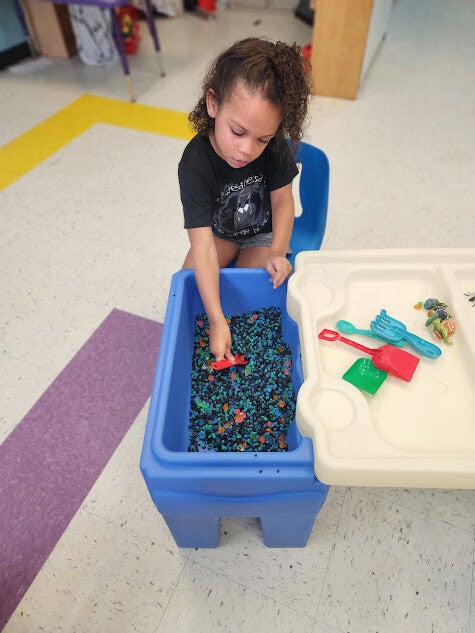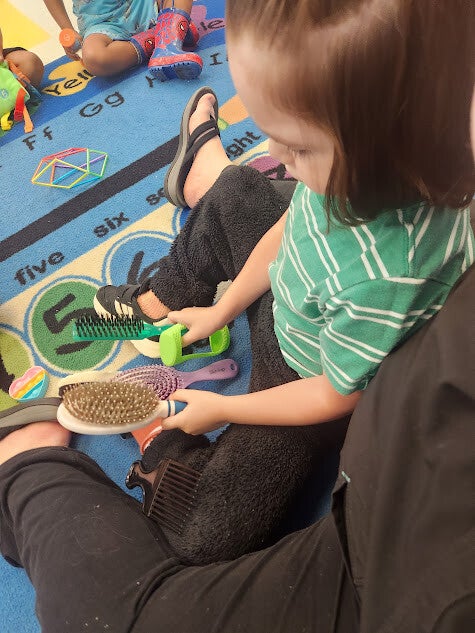Comet Cubs
Toddlers
Our Comet Cubs are busy explorers! In this classroom, toddlers are encouraged to build independence while learning through play, movement, and discovery. With a balance of nurturing care and developmentally appropriate activities, children practice social skills, language, motor development, and problem-solving in a safe and supportive environment. The Comet Cubs classroom is all about curiosity, confidence, and connection. Our focus is on supporting growth across all developmental areas:
-
Social & Emotional Growth
-
Language Development
-
Early Cognitive Skills
-
Motor Development
-
Creative Expression & Sensory Play
-
Self-Help & Independence
Social Emotional Growth
In our toddler classroom, social and emotional growth is encouraged through:
-
Trust & Attachment – Building secure relationships with caregivers, which helps children feel safe, understood, and ready to explore.
-
Self-Awareness – Beginning to recognize their own feelings and needs, and learning that it’s okay to express emotions.
-
Self-Regulation – Developing early coping skills, like using words or gestures with support, instead of frustration or tantrums.
-
Social Interaction – Learning to play alongside peers, practice sharing, and begin simple cooperative play.
-
Empathy & Kindness – Noticing the feelings of others and practicing gentle interactions with friends.
-
Independence – Gaining confidence by making small choices, such as selecting a toy or helping with classroom routines.


Language Development
In our toddler classroom, language development is supported through:
-
Listening & Understanding – Following simple directions, recognizing familiar words, and responding to questions or prompts.
-
Vocabulary Growth – Learning new words each day through songs, stories, play, and conversations with teachers and peers.
-
Expressing Needs & Wants – Using words, short phrases, or sign language to communicate feelings, choices, and requests.
-
Early Conversations – Engaging in back-and-forth exchanges with teachers, even when using only a few words.
-
Storytime & Songs – Building comprehension and memory by listening to books, rhymes, and songs that highlight rhythm and repetition.
-
Imitation & Pretend Play – Practicing language by copying adult speech, naming objects, and using words in dramatic play.
Early Cognitive Skills
-
Cause and Effect – Discovering how their actions make things happen, such as pressing a button to hear a sound or stacking blocks until they tumble down.
-
Problem-Solving – Experimenting with different solutions, like figuring out how to fit puzzle pieces together or how to reach a toy.
-
Memory & Recognition – Remembering familiar people, routines, songs, and stories, and beginning to anticipate what comes next.
-
Colors, Shapes & Sorting – Identifying and categorizing objects by attributes such as color, size, or shape through playful exploration.
-
Pretend Play – Using imagination to “cook,” “talk on the phone,” or care for dolls, which supports abstract thinking and creativity.
-
Exploration & Curiosity – Asking simple questions, pointing, and showing interest in how things work, which lays the foundation for scientific thinking.
By providing toddlers with open-ended play, sensory e

Motor Development
Gross Motor Skills
-
Walking, running, climbing, jumping, and dancing with growing balance and coordination.
-
Practicing skills like kicking and throwing balls, navigating stairs with support, and moving through obstacle play.
-
Building strength and confidence through daily outdoor play and movement-based activities.
Fine Motor Skills
-
Strengthening hand and finger muscles through activities like stacking blocks, stringing beads, and completing simple puzzles.
-
Beginning to hold crayons, scribble, and experiment with drawing or painting.
-
Practicing self-help skills, such as using utensils, drinking from cups, and beginning to dress with assistance (zipping, buttoning, pulling shoes on/off).

Creative Expression and Sensory Play
In our toddler classroom, creative and sensory experiences are encouraged through:
-
Art Exploration – Scribbling, painting with brushes or fingers, gluing, and experimenting with colors and textures without focusing on a finished product.
-
Music & Movement – Singing songs, clapping rhythms, dancing, and playing simple instruments to foster listening skills, coordination, and joy in expression.
-
Pretend Play – Using dolls, play kitchens, dress-up, and role play to encourage imagination, problem-solving, and early social skills.
-
Sensory Play – Engaging with materials like sand, water, playdough, and textured objects to build curiosity, fine motor strength, and language for describing new experiences.
-
Discovery Through Exploration – Providing safe opportunities to test, create, and explore, which nurtures independence and creativity.

Self Help and Independence
Toddlers develop self-help skills through:
-
Feeding Themselves – Using spoons, forks, and open cups, with guidance and encouragement to try new foods and eat independently.
-
Dressing Skills – Practicing putting on shoes, pulling up pants, zipping, or snapping with assistance as needed.
-
Personal Care – Beginning to wash hands, wipe faces, and participate in diapering and toileting routines.
-
Following Routines – Learning to clean up toys, transition between activities, and understand the classroom schedule with teacher support.
-
Making Choices – Building decision-making skills by choosing between toys, activities, or foods, fostering confidence and autonomy.
-
Taking Responsibility – Learning simple classroom jobs, such as helping set the table or putting materials away.